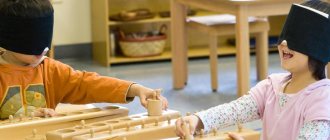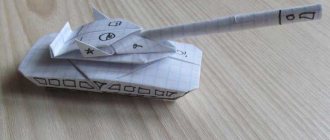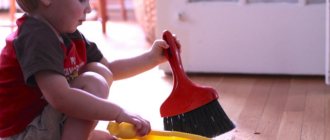An independent child is the dream of most parents. To develop independence in a preschooler means solving 3 tasks that are closely related to each other:
- Objective 1. To develop the child’s independence in the field of cognitive skills. Your child must not only acquire new knowledge himself, but also be able to evaluate it from an ideological standpoint. Remember: “What is good...”;
- Task 2. The acquired knowledge must be able to be applied in practice. "Do it yourself";
- Task 3. How to find such games and techniques to solve the first 2 problems.
What does pedagogy mean by independence?
Independence is not an abstract characteristic. And such activities of children always have a specific focus. Let us highlight the basics of independence for a preschool child:
- he must be able to isolate his position in various situations;
- he plans his activities without outside help and is even capable of acquiring new skills;
- he adequately evaluates his actions, comparing them with the actions of other preschoolers;
- he subordinates his games to certain goals, striving to get results.
The child’s action algorithm can be represented as a triad: a motive arises - I make a plan - I get a result. In different situations - play and everyday, the baby must act in accordance with this triad. And the more initiative he takes, the better.
Three year old crisis
At the age of 3, a child already recognizes himself as an individual. Moreover, a separate, individual personality. If adults at this time completely impose everything on him and completely control him with the help of a system of prohibitions, then the development of independence in children will be impossible.
Often children over 3 years of age show strong stubbornness. This is direct evidence that your child is going through a serious crisis. In various circumstances, you may receive a childish refusal to simple questions: “Do you want ice cream?” - "No". Will you go to the store with me? " - Don't want". So in a child already at 3 years old, in the worst case scenario, “nurturing” independence can lead not only to negativism and stubbornness, but also to obstinacy and selfishness. Few people will like such “skills”. And when there is one preschool-age child growing up in a family, sometimes children’s despotism blossoms in the most “massive” way. No games will help here. Child psychologists should understand such situations.
“Formation of independence in preschool children”
Relevance of the problem.
Modern primary schools place high demands on the level of children's readiness for school. Kindergarten, being the first stage in the education system, performs an important function of preparing children for school. The success of his further education largely depends on how well and in a timely manner a preschooler is prepared for school. Among the qualities of a future schoolchild, researchers especially highlight the child’s independence, because it contributes to the development of his personality as a whole.
Nowadays, many parents provide few opportunities for the development of independence of their child. Due to their busy schedule, they prefer to do it for the child themselves, depriving him of the opportunity to learn how to do it himself. When a three-year-old child comes to kindergarten and cannot independently fasten his sandals, put on tights, use a spoon, etc., he has an internal protest with himself, the child is capricious and flatly refuses to perform this or that action on his own. Unfortunately, the number of such children today is increasing. Then the teacher is faced with the problem of how to resolve this issue creatively and without harming the mental health of the child and his parents.
Having encountered this problem in practical activities with children, understanding the importance of this issue, I decided to pay special attention to the development of independence in preschoolers. I have defined the following tasks for myself :
- studying theoretical approaches to the problem of fostering independence in preschool age;
- identifying levels of independence in preschool children;
- develop self-service skills in children;
- develop children’s independence in cognitive activity, teach them to independently acquire knowledge, and form their own worldview;
- teach children to apply existing knowledge in life situations;
- to cultivate spiritual and moral qualities in children.
I am sure that this will help my students with successful socialization. And in the future - in an active life position.
What is independent activity?
For many adults, an independent child is one who quickly and independently does what he is told (changes clothes, washes himself, eats, etc.), and in general does not interfere with life. Independence is a tricky word, the basis of modern education. I believe that independent activity is an internally motivated activity. A child does something - that’s activity. But this is not so. Let's say children draw a bird. One wants to please the teacher - he tries to draw carefully, but he is not at all interested in this. The second one just likes to draw - he doesn’t care about correctness, he enjoys the process. The third does everything to go play as quickly as possible. The fourth one loves birds very much, so he not only does everything carefully, but also brings something of himself, trying to convey the movement of the wings, the beauty of the plumage. Everyone has the same goal - to draw a bird, but the motives are different, and therefore the results are different.
As L.A. Wenger noted, adults teach children not activities, but only actions. Why is this bad? At the level of action the process always stops, but at the level of activity it continues as creative and independent. Only then do we get the development effect.
I believe that today a child is not motivated to implement different types of activities, does not set independent goals, and only as a result of the work carried out with him masters certain methods of action.
It is important to understand that for the formation of independence, it is the child’s internal, own motivation that is significant. When “need” changes to “want”. The child’s independence in activities is manifested in its selection and implementation, in setting goals, defining and solving problems; when generalizing and transferring methods of action, and not when obediently completing a task assigned by someone. That is why the problem of developing children's independence does not affect the aspect of self-service. The latter is associated with the development of certain skills, which should be regarded as a manifestation of organization, and not independence. The tasks of what the child does are dictated by the requirements of society, and not by its needs, and are performed precisely as a skill, as a habit of acting in a certain way under certain conditions.
So, I am of the opinion that an independent child is one who sets goals for himself and can achieve them.
What does independence look like?
For a long time we had the opinion that a child is not yet a person. It noted only what distinguished him from an adult. It turned out that a small child is an inferior being who cannot think independently, act, or have desires that do not coincide with the desires of adults. What does independence look like? The older the child became, the fewer “imperfections” they found in him, but this did not change the essence of the matter. And only recently have we established a “positivist” approach to the development of a child: the child’s right to be an individual has finally been recognized. And independence is a faithful companion to personal development. What is independence? It would seem that the answer lies on the surface, but we all understand it a little differently. Most typical answers:
“this is an action that a person carries out on his own, without the prompting or help of others”;
“the ability to rely only on one’s own strength”;
“independence from the opinions of others, freedom of expression of one’s feelings, creativity”;
“the ability to manage oneself, one’s time and one’s life in general”;
“the ability to set yourself tasks that no one has set before you, and solve them yourself.”
It is difficult to argue against these definitions. They accurately indicate a person’s independence and, by and large, the maturity of his personality. But how to apply these assessments to a 3-year-old child? Almost none of them can be used without significant reservations. Does this mean that those psychologists were right who argued that complete independence is not available to children and therefore it is premature to talk about the child’s personality? Yes and no. A child’s independence is, of course, relative, but it begins in early childhood. It is very difficult to recognize it in a child: we operate with the criteria of “mature” independence, but in him it is expressed implicitly, often mimics other qualities or is only partially detected. Guessing its manifestations, helping the first shoots to strengthen and develop is not an easy task. Both overestimation and underestimation of a child's emerging independence are very important for the developing personality of the child and are fraught with the same result - the helplessness of our children in the face of life's problems, and even severe delays in development.
How to foster independence in preschoolers?
I assume that the task of every child is to become an adult, an independent person who knows how to make decisions, be responsible for his actions, make informed choices and build his own life. The task of adults is to help him in this difficult task. The main difficulty in developing children's independence in a teacher lies in the expenditure of his personal qualities: patience, the ability to implement a personality-oriented and activity-based approach. Independence and responsibility are built gradually, and this should be started as early as possible.
I consider the following teaching methods to be the most effective:
- problem-based learning;
- TRIZ methods;
- gaming technologies;
- health-saving technologies
Each child is a unique personality and develops individually. Temperament, his innate abilities, area of interest, even family practice of reward and punishment - all significantly influence the pace of development of children's independence.
Let me give you an example from my practice. There were children in the group who felt insecure, constrained, had difficulty expressing their thoughts, some experienced fear and uncertainty when communicating. I set a goal for myself: to liberate the children, to ensure that every child without fear talks about their activities not only in front of their comrades, but also in front of unfamiliar adults. This work began in middle age. In the group, we often talked about various topics: about migratory and wintering birds, about animals in our zoo, about work, about professions, about various events that happened in the lives of children, etc. During these conversations, the children independently proposed their own ideas for the these topics in the form of drawings, crafts, poems. And in the older group, I could be proud of the result of my work: the children freely exchanged information and drew conclusions, this was especially significant in the “All Work is Good” project. Together with the children, we chose the profession of construction. But this profession covers a number of other individual professions, without which it is impossible to build a house: roofer, mason, crane operator, etc. When we were preparing this project, the children independently made a choice about how they would participate in the project. Some decided to become a designer, while others decided to become a carpenter, plasterer, or painter. And when asked why this particular profession, the children justified their choice. And there were those who took a place in the auditorium. And this was also an independent choice.
In addition, participation in the project helped children learn to speak publicly and feel free in front of an audience of adults and children. Now I can say with confidence that in the future children will be able to freely express their opinions in front of an audience, communicate freely with peers and adults, act independently without prompting, freely express their feelings, set tasks for themselves and solve them themselves. And I believe that this is my merit.
What difficulties arise when implementing independent activities?
During my work, I identified a number of difficulties:
- firstly, there is insufficient theoretical knowledge on this issue;
- secondly, parents’ lack of readiness to skillfully guide, develop, and enrich children’s independent activities;
- thirdly, insufficient use of various situations to develop children’s independence;
- fourthly, the indifference of some parents to their child’s activities. The child is left to his own devices, his initiative is not supported by his parents.
The result of work on the formation of independence in preschool children.
As a result of the work, I noticed that the children became more independent and active in completing work, understood the meaning of the word “independence”, and freely used this concept in relation to themselves and their peers. The level of self-control has increased, and children’s assessment of their capabilities has become more objective.
To summarize the work done, we can say that such a child’s personality trait as independence must be developed throughout the entire preschool period.
I consider myself a creative educator and try to live and work according to the principle: “If you want to cultivate independence, courage of mind in children, instill in them the joy of co-creation, then create such conditions so that the sparks of their thoughts form the kingdom of thought, give them the opportunity to feel themselves in it lord."
Give your child a choice
What should parents do if they want to develop their child’s independence? Your baby should be able to make independent choices in everyday situations :
- what toy he wants to play with;
- orange or apple for breakfast;
- will draw with pencils or paints;
- what he wants to draw;
- walk with dad in the yard or go with mom to visit her friend.
And, of course, you can’t completely suppress a child’s initiatives. Adults just need to be sure to control the boundaries of children’s behavior. This is necessary in order to guarantee the safety of the child’s activities. Children do not have the skill to anticipate danger. It also needs to be shaped, just like the development of independence.
Patiently moving along the steps of independence
In the process of developing independence in a child, 3 stages can be distinguished from a very early age:
- Teach your child to act in various everyday situations without unnecessary reminders - after playing, put away the toys yourself, wash your hands before eating, say “thank you” to your grandmother for the pies. These elementary skills are basic for preschoolers of any age.
- This is a difficult stage that characterizes the child’s high-level independence. Learned how to put away your toys, help your mom sweep the floor or put things in the closet. Bring grandma who came to visit a chair or give her a glass of water. You can simulate such situations and monitor the manifestation of various qualities of the baby. For example, dad lost his glasses. How will he find them if he doesn’t see them now? The child helps look for them (the glasses, of course, are in a visible place) and gains the skill of being able to help another person.
- This is already the stage of distant transfer. You and your child discussed the problem that older people are not given a seat in public transport. And now your child is in a hurry to give way to an unfamiliar old woman. And in the sandbox, he helps the kids collect sand into a bucket. You are growing up to be an independent person of preschool age.
So, starting most often from the game, you move along the steps on which the development of your baby’s independence is formed.
What is the relationship between reading and independence?
It's quite simple.
When a child picks up a book, a completely different world opens up before him, full of new emotions and sensations. Through the analysis of the lifestyle of the book’s characters, behavior patterns are formed, an awareness of good and evil, friendship, and empathy comes.
This is very useful for forming a worldview and, of course, allows you to learn some rules of socialization that will be useful to children in the future.
What if the book is also personalized for your baby? Just imagine, this means that he has his own unique book, the main character of which is himself!
How much do you think the “absorption” of what is heard or read increases , how many times more boldly does the child begin to make decisions, being in his own fairy-tale world! Plus, such books are aimed at cultivating a child’s awareness of his uniqueness and uniqueness, which is an integral feature of a holistic personality that stands firmly on its own two feet.
In other words, this is your assistant, starting from your baby’s leisure time, ending with the formation of his correct and healthy beliefs about himself, the knowledge of his personality, which is still hiding and is afraid to show itself to the world. But you and I now know how to help her relax.
Childhood is the most favorable period for pedagogical influences and the development of independence. So let's all take advantage of this magical moment together.
We have already mentioned that competent education allows children to build a correct picture of the world. And most importantly: believe in children, support them and serve as a worthy example for them. It is important for every parent to remember the common truth that raising children begins with raising yourself.
So, in what processes and situations are you ready to begin developing the ability to be independent in your child?
Do you already have a list?!
Give up the regime from under the stick
An important element that is included in nurturing the independence of preschoolers is teaching self-service skills. What adults do easily and habitually can sometimes be difficult for children. No matter what age the child is, you should never act in “under attack” mode. This is not a method of modern education at all. Of course, some skills can be “hammered” by force. But, of the various methods, this is the worst. Use personal example, games, modeling behavior in various everyday situations, etc. Teach your child to truly act independently. But never use brute force. Don’t suppress your child’s fantasies and encourage his initiatives. This is the only, albeit more difficult, path to success.
What does it mean to “educate”?
Let's think about what the seemingly understandable “educate” means, which sometimes begins with a dialogue with a child or with the fact that we frantically hide the TV remote control somewhere out of sight.
“Educating does not mean only feeding and nursing, but also giving direction to the heart and mind.” — V.G. Belinsky
Wise education should be aimed at nurturing an individual with strong moral foundations. If you, as parents, have laid a solid foundation of moral principles and standards of behavior, family values will play a decisive role in the formation of personality.
We are convinced that in order to understand the approximate picture, any parent should know about models and approaches to raising their children, which are applicable depending on the psychological characteristics of the child and the traditions of a particular family.
Rely on the positive. By emphasizing and developing the best that is in your baby, his strengths, you will create a source of positive motivation for the child, and also receive the key to his heart, earning children's recognition.
Humanization
Humanization as respect for the pupil’s life position and rights even when he stomps his feet and protests. In the process of socialization, respect for the position of others, instilled in a child as a value, can serve an invaluable service.
Personal approach
The personal approach suggests taking into account the personal and psychological characteristics of children: character traits, temperamental characteristics, tastes, habits and interests. This promotes the development of creativity and independence.
Unity of educational influences.
The method is based on uniform norms and rules of behavior necessary for the successful socialization of children in the environment. family, friends, school, interest groups and society in its entirety.
Any concept can be used as a leading concept and all concepts can complement each other . At the same time, it is always important to remember to take into account the individual characteristics of the child.
Do as I do
A preschool child takes great pleasure in copying adults in various situations. This way you can develop in your child the ability to wash his face in the morning, brush his teeth, and wash his hands before eating.
Introduce some game elements into the process. For example, do you loudly announce: “Who is going to brush their teeth first today?” “He himself chooses a banana or an apple for breakfast.” In such situations, you support the child in a state of constant but independent choice. He himself decided to brush his teeth, he did it himself, he chose fruit for breakfast. Or you can compete. “Who will be the first to get dressed for a walk”? “Who makes the bed best?” This replay of simple everyday moments allows you to instill in your child the ability to act independently in life situations.
Be sure to model the conditions of personal initiative for your child. Pretend that you paused at the bathroom door. Watch what the child does. Does he wash himself? Brushing his teeth? If so, then congratulate yourself on your small victory and move on. In the “do as I do” mode, you can teach your child to dress and put on his own shoes from an early age.
Tamed - answer
The issue of animals in the house is complex and responsible. They will, of course, add to your everyday worries. But in many everyday situations, it is animals that become your best helpers.
When you need to take care of someone from an early age, you yourself involuntarily become more mature and independent. It doesn’t matter whether it’s a hamster or fish in an aquarium, a dog or a canary. When caring for any animal, a lot of different situations arise when the child can be placed in conditions of various initiatives. Preschool children really enjoy picking grass for the hamsters, feeding the fish, walking the dog (in the presence of adults, of course), and changing the water for the canary. It’s even difficult to list all the skills that arise and improve during this process. And, of course, playing with animals is always very useful.
Experts note that those kids who take care of their pets from an early age amazingly demonstrate skills that, it seems, they were not taught. They know how to dress themselves, put away toys in their room, and put their things in the closet. Thus, as a result of living and playing with pets, preschoolers’ level of independence significantly increases.
Caution first
When a child independently tries to cut bread with a sharp knife, or turn on a gas stove or iron, then difficult times come for adults. Many different dangers await our preschoolers. This requires special skills and abilities. Sometimes games just can't help you. And the system of strict prohibitions is also not guaranteed to be safe. Suppress your first natural desire to shout to your baby: “Don’t you dare ever do this, you can’t”! Forbidden fruit, you know how it is. Teach your child the skills to use complex equipment calmly. Patiently explain to him all the dangers of playing with them and the consequences of unauthorized inclusions.
A few words about the concept of “independence”
Independence is often understood as a specific property of an individual that helps to realize oneself as a person. Currently, teachers and psychologists pay a lot of attention to the development of children's independence during the period of preparing preschool children for the start of school. This is the most important period in the development of a child’s personality.
If a child is independent, he takes initiative and takes a responsible approach to any activity. Independent children exhibit some independence. Whether it's a gaming or educational activity.




